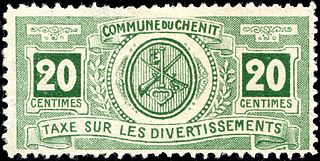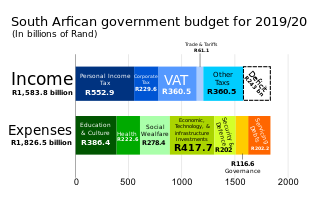Tax deduction is a reduction of income that is able to be taxed and is commonly a result of expenses, particularly those incurred to produce additional income. Tax deductions are a form of tax incentives, along with exemptions and credits. The difference between deductions, exemptions and credits is that deductions and exemptions both reduce taxable income, while credits reduce tax.

Taxation in the United Kingdom may involve payments to at least three different levels of government: central government, devolved governments and local government. Central government revenues come primarily from income tax, National Insurance contributions, value added tax, corporation tax and fuel duty. Local government revenues come primarily from grants from central government funds, business rates in England, Council Tax and increasingly from fees and charges such as those for on-street parking. In the fiscal year 2014–15, total government revenue was forecast to be £648 billion, or 37.7 per cent of GDP, with net taxes and National Insurance contributions standing at £606 billion.
The schedular system of taxation is the system of how the charge to United Kingdom corporation tax is applied. It also applied to United Kingdom income tax before legislation was rewritten by the Tax Law Rewrite Project. Similar systems apply in other jurisdictions that are or were closely related to the United Kingdom, such as Ireland and Jersey.
Per diem or daily allowance is a specific amount of money that an organization gives an individual, typically an employee, per day to cover living expenses when travelling on the employer's business.

Taxation in the Republic of Ireland in 2017 came from Personal Income taxes, and Consumption taxes, being VAT and Excise and Customs duties. Corporation taxes represents most of the balance, but Ireland's Corporate Tax System (CT) is a central part of Ireland's economic model. Ireland summarises its taxation policy using the OECD's Hierarchy of Taxes pyramid, which emphasises high corporate tax rates as the most harmful types of taxes where economic growth is the objective. The balance of Ireland's taxes are Property taxes and Capital taxes.
In the United Kingdom, Inheritance Tax is a transfer tax. It was introduced with effect from 18 March 1986, replacing Capital Transfer Tax.

Entertainment tax also sometimes referred to as "amusement tax" is any tax levied on any form of commercial entertainment, such as movie tickets, exhibitions, sport events and more. The specific rules such as the tax rate of entertainment tax and cases of tax exemption are subject to local authorities, as is their collection. The entertainment tax has in the most cases the form of indirect tax, which is levied on buyer. Nowadays, the most discussed subject of those taxes are their implementations to online services, especially the ones working on streaming basis such as Netflix, Spotify and others.

Deferred tax is a notional asset or liability to reflect corporate income taxation on a basis that is the same or more similar to recognition of profits than the taxation treatment. Deferred tax liabilities can arise as a result of corporate taxation treatment of capital expenditure being more rapid than the accounting depreciation treatment. Deferred tax assets can arise due to net loss carry-overs, which are only recorded as asset if it is deemed more likely than not that the asset will be used in future fiscal periods. Different countries may also allow or require discounting of the assets or particularly liabilities. There are often disclosure requirements for potential liabilities and assets that are not actually recognised as an asset or liability.

Salaries tax is a type of income tax that is levied in Hong Kong, chargeable on income from any office, employment and pension for a year of assessment arising in or derived from the territory. For purposes of calculating liability, the period of assessment is from April 1 to March 31 of the following year.
In Hong Kong, profits tax is an income tax chargeable to business carried on in Hong Kong. Applying the territorial taxation concept, only profits sourced in Hong Kong are taxable in general. Capital gains are not taxable in Hong Kong, although it is always arguable whether an income is capital in nature.
An inheritance tax is a tax paid by a person who inherits money or property of a person who has died, whereas an estate tax is a levy on the estate of a person who has died.
Taxes in India are levied by the Central Government and the State Governments by virtue of powers conferred to them from the Constitution of India. Some minor taxes are also levied by the local authorities such as the Municipality.
Under Article 108 of the Basic Law of Hong Kong, the taxation system in Hong Kong is independent of, and different from, the taxation system in mainland China. In addition, under Article 106 of the Hong Kong Basic Law, Hong Kong has independent public finance, and no tax revenue is handed over to the Central Government in China. The taxation system in Hong Kong is generally considered to be one of the most simple, transparent, and straightforward systems in the world. Taxes are collected through the Inland Revenue Department (IRD).
Taxation in the British Virgin Islands is relatively simple by comparative standards; photocopies of all of the tax laws of the British Virgin Islands would together amount to about 200 pages of paper.

Taxation may involve payments to a minimum of two different levels of government: central government through SARS or to local government. Prior to 2001 the South African tax system was "source-based", wherein income is taxed in the country where it originates. Since January 2001, the tax system was changed to "residence-based" wherein taxpayers residing in South Africa are taxed on their income irrespective of its source. Non residents are only subject to domestic taxes.
Indian tax forms are used to document information in compliance with the Income Tax Act of 1961 and in accordance with the Income Tax Rules, which govern the process of filing income tax returns in India.

The Wealth Tax Act, 1957 was an Act of the Parliament of India that provides for the levying of wealth tax on an individual, Hindu Undivided Family or company. The wealth tax was levied on the net wealth owned by a person on a valuation date, i.e., 31 March of every year. The Act applies to the whole of India. The application of the Act has been discontinued since 1 April 2016.
The Interest Tax Act, 1974 was an Act that imposed a special tax on interest accrued in specified cases. The Act applied to the whole of India, including all the States and Union Territories with no exceptions. The Act is no longer applicable with regard to chargeable interest accruing after 31 March 2000.
The Legal Services Authorities Act 1987 is an Act of the Indian Parliament to enforce the provisions of Article 39 A of the Constitution guaranteeing the fundamental rights to all the citizens of the country. Article 39 A of the constitution is relating to promoting justice on the basis of equal opportunity by providing free legal aid to unaffordable sections of society like poor and economic weaker sections. Among other things the act deals with pay and qualifications of staff. The Act resulted in creation of The National Legal Services Authority (NALSA) across country.
The 2017 Union Budget of India is the







